
Jun 14, 2017 | Non categorizzato
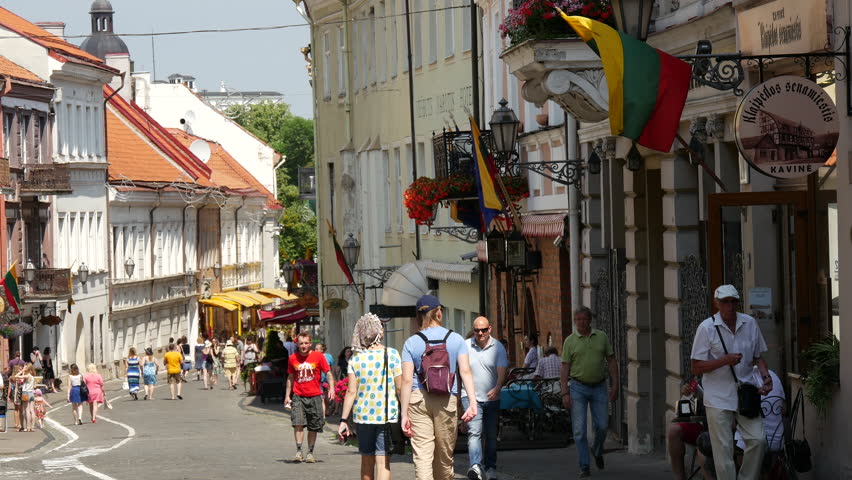
Škofja Loka
 “About a year ago,” Natalija continues, “we were put to the test. In summer, the smallest of our children underwent some counselling, which is done routinely when infants reach the age of three. The psychologist’s diagnosis really surprised us: Attention Deficit Disorder. As an ex-teacher and pedagogue expert, I saw before my eyes all those children who had this type of problem and the difficulties parents had to face in dealing with it. Shocked and dazed, I went back to Ray of Sunshine kindergarten, where Damijan and I both worked. We talked things over for a long time and we realized that for our son to have the best care, one of us had to give up their job.” “We knew we had to devote all our time and energy,” says Damijan. “We were conscious of the fact that we still had a mortgage, that we were six in the family and that we were low-income earners. We explored all the financial possibilities and, despite the uncertainty, I left my job believing that God would not abandon us. We shared our situation, and consequent decision, with our work colleagues. We were grateful to each one for their understanding and support. In the following week, our choice proved to be the right one. On night, my mother, who lived with us, had a stroke and remained paralyzed. It was a shock for us all. For the first two months she was able to feed herself, but there was a subsequent stroke that led to blindness and then dementia. She therefore needed more and more care. Although challenging, we respected her desire to remain at home. In the meantime, our son’s condition improved considerably. In fact things were much calmer all round. When the children arrived home from school, there was always someone waiting for them with a meal on the table. And when Natalija arrived home from work, she was able to devote herself totally to the family. Throughout this time, though living on only one salary, we can say that we lack nothing. And even if we have to give up something, it’s not a deprivation. We are grateful to God for having supported us and for having taught us to live the art of loving, and also to reap the fruits which have won us over completely.”
“About a year ago,” Natalija continues, “we were put to the test. In summer, the smallest of our children underwent some counselling, which is done routinely when infants reach the age of three. The psychologist’s diagnosis really surprised us: Attention Deficit Disorder. As an ex-teacher and pedagogue expert, I saw before my eyes all those children who had this type of problem and the difficulties parents had to face in dealing with it. Shocked and dazed, I went back to Ray of Sunshine kindergarten, where Damijan and I both worked. We talked things over for a long time and we realized that for our son to have the best care, one of us had to give up their job.” “We knew we had to devote all our time and energy,” says Damijan. “We were conscious of the fact that we still had a mortgage, that we were six in the family and that we were low-income earners. We explored all the financial possibilities and, despite the uncertainty, I left my job believing that God would not abandon us. We shared our situation, and consequent decision, with our work colleagues. We were grateful to each one for their understanding and support. In the following week, our choice proved to be the right one. On night, my mother, who lived with us, had a stroke and remained paralyzed. It was a shock for us all. For the first two months she was able to feed herself, but there was a subsequent stroke that led to blindness and then dementia. She therefore needed more and more care. Although challenging, we respected her desire to remain at home. In the meantime, our son’s condition improved considerably. In fact things were much calmer all round. When the children arrived home from school, there was always someone waiting for them with a meal on the table. And when Natalija arrived home from work, she was able to devote herself totally to the family. Throughout this time, though living on only one salary, we can say that we lack nothing. And even if we have to give up something, it’s not a deprivation. We are grateful to God for having supported us and for having taught us to live the art of loving, and also to reap the fruits which have won us over completely.”
Jun 14, 2017 | Non categorizzato
For your commitment to peace, promoting a series of initiatives to convert a weapons factory in the province of Iglesias” (Sardinia, Italy). The missive, dated June 3 addressed the local community of the Focolare Movement, (New Humanities section), for all the endeavours undertaken with Amnesty International, Oxfam, Fondazione Banca Etica, Opal Brescia and Italian Disarmament Network, for the “RVM reconversion” (Multinational Arms-producing Company). The Holy Father said he was “happy to know that you are concretely involved in promoting a dignified employment, as an alternative to the manufacture of arms, in a territory that is still undergoing serious employment crises.” Lastly, he expressed his “solidarity for the commitment in spreading the culture of peace.”
![The dialogue wanted by God]()
Jun 13, 2017 | Non categorizzato
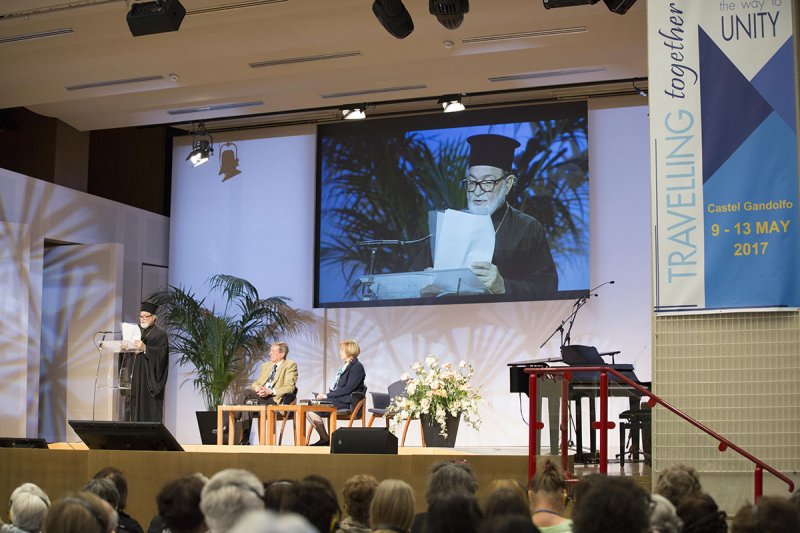 Patriarch Athenagoras and Chiara Lubich, protagonists of unity. Beginning again is never and never has been easy, especially if deep trenches have been dug over time, if certain differences have become cultural, if – to complicate matters – there is even the certainty of being in the right. It wouldn’t be far from the truth to say that this was the situation in the mid-1900s between the Catholic and the Orthodox Church, after centuries, an entire millennium, the separation was nurtured and cultivated. Then…the historic turning point. The celebrated and unforgettable and glorious memories of the initiators of the ‘dialogue of Love’, the great inventors of the dialogue of the people: Athenagoras, Ecumenical Patriarch, and Chiara Lubich, foundress of the Movement of unity. With their humble, serious and willingness, with dedication, love and prayer they were the initiators of a new ecumenical Era; they instructed the peoples, giving them courage, strength, patience, faithfulness, willingness, love and unity. Deep down the solution was simple, and the Patriarch expressed it with the following words: “We lived alone, without brothers, without having sisters for many centuries, like orphans. Why? The brother and sister are the door. There lies the secret!” The unforgettable protagonists of the ‘dialogue of love’, the great inventors of the dialogue of the people met a good 27 times, between 1967 and 1972 when the Patriarch died. There first encounter goes back to June 13th, 1967 when Lubich visited the Ecumenical Patriarchate of Constantinople, even though, until this day, that moment has never been adequately appreciated for its full value. The Patriarch approved and lovingly embraced the seriousness of the charism of Chiara, her mystical spirituality that is a spirituality of the Church, to the point that their encounter was even considered ‘an ecstasy’, and the conviction grew more and more in him that by living the words of Jesus’s Testament could lead us to the same chalice. With these touching words he remarked: ‘For me it would be a day of Paradise.’
Patriarch Athenagoras and Chiara Lubich, protagonists of unity. Beginning again is never and never has been easy, especially if deep trenches have been dug over time, if certain differences have become cultural, if – to complicate matters – there is even the certainty of being in the right. It wouldn’t be far from the truth to say that this was the situation in the mid-1900s between the Catholic and the Orthodox Church, after centuries, an entire millennium, the separation was nurtured and cultivated. Then…the historic turning point. The celebrated and unforgettable and glorious memories of the initiators of the ‘dialogue of Love’, the great inventors of the dialogue of the people: Athenagoras, Ecumenical Patriarch, and Chiara Lubich, foundress of the Movement of unity. With their humble, serious and willingness, with dedication, love and prayer they were the initiators of a new ecumenical Era; they instructed the peoples, giving them courage, strength, patience, faithfulness, willingness, love and unity. Deep down the solution was simple, and the Patriarch expressed it with the following words: “We lived alone, without brothers, without having sisters for many centuries, like orphans. Why? The brother and sister are the door. There lies the secret!” The unforgettable protagonists of the ‘dialogue of love’, the great inventors of the dialogue of the people met a good 27 times, between 1967 and 1972 when the Patriarch died. There first encounter goes back to June 13th, 1967 when Lubich visited the Ecumenical Patriarchate of Constantinople, even though, until this day, that moment has never been adequately appreciated for its full value. The Patriarch approved and lovingly embraced the seriousness of the charism of Chiara, her mystical spirituality that is a spirituality of the Church, to the point that their encounter was even considered ‘an ecstasy’, and the conviction grew more and more in him that by living the words of Jesus’s Testament could lead us to the same chalice. With these touching words he remarked: ‘For me it would be a day of Paradise.’  Not much time was needed before the Patriarch declared himself to be a “focolarino” and began to call Lubich by the name of “Tecla,” having discerned in her the same zeal as the isapostolo [equal to the Apostles]. He went on to say: ‘We are thirsty for this spirituality.’ Meanwhile, Chiara was equally touched and to her the Patriarch ‘appeared as an Archangel that struggles and fights to the end for his ideal: a man of God, proven in heroic love and heroic patience’. With her spirituality and marvellous personality, Chiara not only prepared the two principle and most important Bridges: Paul VI and Athenagoras, but she also managed to unite those two Bridges. Through encounters between Orthodox and Catholics, the bond of mutual love mitigated the sorrow of not being able to share the Eucharist; indeed, it made this cross loveable as a contribution of the Christian People to that One Chalice. “The Pope is our leader,” the Patriarch confided to Chiara. “…sometimes I see the Pope ‘in agony,’ because he knows everything that there is of negative in the world. This is why I placed myself one hundred percent at his service. I follow him, I understand him, I love him, I respect him, I admire him.” As a follow-up of this fifty-year journey, I personally proposed to Msgr Piero Coda, president of Sophia University Institute (SUI), the institution of an Ecumenical Chair in recognition of these two extraordinary protagonists of brotherhood among the Orthodox and Catholic Church. My proposal received magnanimous and cordial approval, along with the blessing of Patriarch Bartholomew and the enthusiastic support of Focolare president, Maria Voce. Let us offer from our hearts one great ‘thank you’ like beautiful flowers to Athenagoras and to Chiara who were sent by God, who gave their life above all else to the realization of God’s will: ‘Tthat all be one’, for it will given as a gift of the Holy Spirit.
Not much time was needed before the Patriarch declared himself to be a “focolarino” and began to call Lubich by the name of “Tecla,” having discerned in her the same zeal as the isapostolo [equal to the Apostles]. He went on to say: ‘We are thirsty for this spirituality.’ Meanwhile, Chiara was equally touched and to her the Patriarch ‘appeared as an Archangel that struggles and fights to the end for his ideal: a man of God, proven in heroic love and heroic patience’. With her spirituality and marvellous personality, Chiara not only prepared the two principle and most important Bridges: Paul VI and Athenagoras, but she also managed to unite those two Bridges. Through encounters between Orthodox and Catholics, the bond of mutual love mitigated the sorrow of not being able to share the Eucharist; indeed, it made this cross loveable as a contribution of the Christian People to that One Chalice. “The Pope is our leader,” the Patriarch confided to Chiara. “…sometimes I see the Pope ‘in agony,’ because he knows everything that there is of negative in the world. This is why I placed myself one hundred percent at his service. I follow him, I understand him, I love him, I respect him, I admire him.” As a follow-up of this fifty-year journey, I personally proposed to Msgr Piero Coda, president of Sophia University Institute (SUI), the institution of an Ecumenical Chair in recognition of these two extraordinary protagonists of brotherhood among the Orthodox and Catholic Church. My proposal received magnanimous and cordial approval, along with the blessing of Patriarch Bartholomew and the enthusiastic support of Focolare president, Maria Voce. Let us offer from our hearts one great ‘thank you’ like beautiful flowers to Athenagoras and to Chiara who were sent by God, who gave their life above all else to the realization of God’s will: ‘Tthat all be one’, for it will given as a gift of the Holy Spirit.
Metropolitan Gennadios Zervos,
Archbishop of Italy and Malta of the Ecumenical Patriarchate of Constantinople
Jun 13, 2017 | Focolare Worldwide
http://vimeo.com/95726085
Jun 13, 2017 | Non categorizzato
What can you do? Donate blood. Donate often. This is the slogan chosen by the World Health Organisation for the celebration of the World Blood Donor Day on 14 June. Some of the objectives of the campaign: to encourage all citizens to reinforce the efficiency of healthcare services; involve the authorities in the creation of National programmes to respond to the growing needs; favour the inclusion of transfusion services in emergency situations; guarantee the supply and reach self-sufficiency nationwide; thank the people who donate blood regularly; promote international cooperation; ensure voluntary donation and enhance security and availability of blood.

Jun 12, 2017 | Non categorizzato
 Belgrade (“the white city”) in Central Serbia, one of Europe’s oldest cities,lies at the confluence of the Sava and Danube Rivers. “Gateway to the Balkans” or “Gateway to Europe,” reborn after a recent past of wars, it is today an avant-garde capital, where new ideas, novelties and vitality brew in the fields of art, economy, architecture. and also sports. Last 12-13 May, on the occasion of the 20th anniversary of its foundation, the College of Sports and Health, a certified institution with 600 students, organised an international conference entitled “Sports, recreation, health.” Sportmeet was among the guests invited by Prof. Alexander Ivanovski, also as the expression in the world of sports of that social and spiritual renewal that originated from the experience of the Focolare: a global network of sports lovers, professional and amateur sportsmen and women, teachers, instructors, journalists, managers and operators of the sports business, who live sports as a positive reality for the discussion and exchange of ideas, and as an occasion not only to work up one’s body, but also for universal brotherhood and inclusion. Paolo Cipolli, Sportmeet President, at the conference with a Serb-Croatian delegation entitled his speech Sports moves people and moves ideas. The “sports phenomenon” is one of the more complex, interesting and compelling realities of our time, involving 800 million practitioners, five million sports associations, 205 national federations, and members of the International Olympics Committee, 208 of which belong to the International Soccer Association.
Belgrade (“the white city”) in Central Serbia, one of Europe’s oldest cities,lies at the confluence of the Sava and Danube Rivers. “Gateway to the Balkans” or “Gateway to Europe,” reborn after a recent past of wars, it is today an avant-garde capital, where new ideas, novelties and vitality brew in the fields of art, economy, architecture. and also sports. Last 12-13 May, on the occasion of the 20th anniversary of its foundation, the College of Sports and Health, a certified institution with 600 students, organised an international conference entitled “Sports, recreation, health.” Sportmeet was among the guests invited by Prof. Alexander Ivanovski, also as the expression in the world of sports of that social and spiritual renewal that originated from the experience of the Focolare: a global network of sports lovers, professional and amateur sportsmen and women, teachers, instructors, journalists, managers and operators of the sports business, who live sports as a positive reality for the discussion and exchange of ideas, and as an occasion not only to work up one’s body, but also for universal brotherhood and inclusion. Paolo Cipolli, Sportmeet President, at the conference with a Serb-Croatian delegation entitled his speech Sports moves people and moves ideas. The “sports phenomenon” is one of the more complex, interesting and compelling realities of our time, involving 800 million practitioners, five million sports associations, 205 national federations, and members of the International Olympics Committee, 208 of which belong to the International Soccer Association.  Considering that “only” 192 nations are part of the UN, its weight and omnipresence, like a sort of planetary power, or as some say a “new religion” is obvious. It is an area of infinite economic interest, but sad to say, also of delinquency, while on the contrary, sports can become a “training ground” for brotherhood, unity and integration – a universal “language of gestures” that brings down barriers, obstacles and diversities. In Belgrade, the clean aspect of sports was staged. Among the many speeches on the various aspects connected to the role and potential of sports in the promotion of health, a common consideration emerged among experts and teachers from Slovenia, Croatia, Macedonia and Bulgaria: the need to define new policies for a full valorisation of sports in view of a correct lifestyle, and all the possible forms of integration, especially among the youth. The conference was the occasion to establish new relationships and an agreed protocol in view of future cooperation, giving value to important experiences already underwaysuch as the use of games in some cases of youth hospitality. After Belgrade, Sportmeet is now focused on the next steps, social inclusion, sports education, integration of the people with diverse abilities and relationship between generationsto be undertaken from 13 – 16 July in Spain. In these four days of sports testimonies, and starting from the international symposium of Barcelona (at the Palau Roberton 13 July),operators will discuss with one another, regarding theholding of a Summer School in Castel d’Aro, some hundred kilometers from the Catalunyan capital. Promoted in cooperation with other local partners, among which is the UniversitatAutònoma de Barcelona, it will be a rich programme to make people aware of inclusive sports and good sportive practice – with the dream that “sports” may really become synonymous to “encounter” at all levels.
Considering that “only” 192 nations are part of the UN, its weight and omnipresence, like a sort of planetary power, or as some say a “new religion” is obvious. It is an area of infinite economic interest, but sad to say, also of delinquency, while on the contrary, sports can become a “training ground” for brotherhood, unity and integration – a universal “language of gestures” that brings down barriers, obstacles and diversities. In Belgrade, the clean aspect of sports was staged. Among the many speeches on the various aspects connected to the role and potential of sports in the promotion of health, a common consideration emerged among experts and teachers from Slovenia, Croatia, Macedonia and Bulgaria: the need to define new policies for a full valorisation of sports in view of a correct lifestyle, and all the possible forms of integration, especially among the youth. The conference was the occasion to establish new relationships and an agreed protocol in view of future cooperation, giving value to important experiences already underwaysuch as the use of games in some cases of youth hospitality. After Belgrade, Sportmeet is now focused on the next steps, social inclusion, sports education, integration of the people with diverse abilities and relationship between generationsto be undertaken from 13 – 16 July in Spain. In these four days of sports testimonies, and starting from the international symposium of Barcelona (at the Palau Roberton 13 July),operators will discuss with one another, regarding theholding of a Summer School in Castel d’Aro, some hundred kilometers from the Catalunyan capital. Promoted in cooperation with other local partners, among which is the UniversitatAutònoma de Barcelona, it will be a rich programme to make people aware of inclusive sports and good sportive practice – with the dream that “sports” may really become synonymous to “encounter” at all levels.
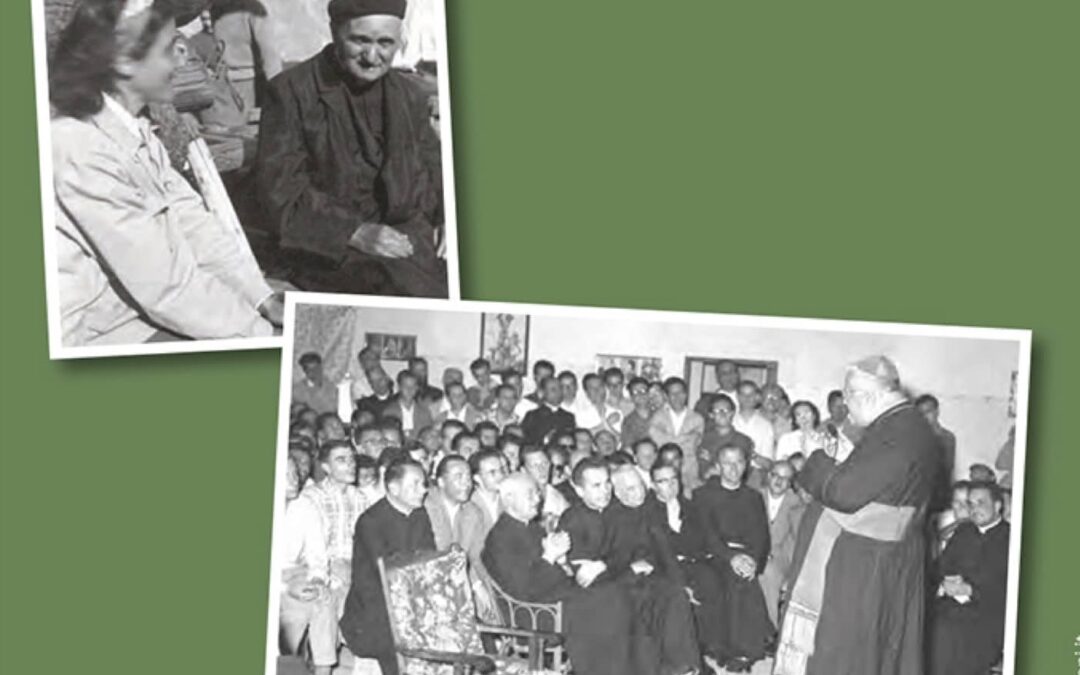
Jun 10, 2017 | Non categorizzato
 The then Archbishop of Trento, Msgr. Carlo de Ferrari, had the task of first assessing and approving the Focolare Movement at the diocesan level. The title of the recent book published by Città Nuova Publishing House “Qui c’è il dito di Dio” (Here Is the Hand of God), recalls the expression he used in reference to the evangelical experience that Chiara Lubich and her first companions were living. The context is 1951, a period when not everyone in the Church thought the same as the archbishop of Trent. Indeed, there were many ecclesiastical perplexities and suspicions, in pre-Vatican Council times, with regards to this young lay woman, who had as her followers priests, men and women religious, lay men and women, young people and not so young. Prudence suggested distancing her and perhaps replacing her with a priest. It was through these circumstances that Chiara’s decisive relationship with her bishop began. The book opens with a letter from Chiara Lubich, written from Rome, to Archbishop Carlo de Ferrari. The letter is dated January 5, 1951 and the period of trial that the nascent Movement and Chiara herself were experiencing shines through every line of the text.
The then Archbishop of Trento, Msgr. Carlo de Ferrari, had the task of first assessing and approving the Focolare Movement at the diocesan level. The title of the recent book published by Città Nuova Publishing House “Qui c’è il dito di Dio” (Here Is the Hand of God), recalls the expression he used in reference to the evangelical experience that Chiara Lubich and her first companions were living. The context is 1951, a period when not everyone in the Church thought the same as the archbishop of Trent. Indeed, there were many ecclesiastical perplexities and suspicions, in pre-Vatican Council times, with regards to this young lay woman, who had as her followers priests, men and women religious, lay men and women, young people and not so young. Prudence suggested distancing her and perhaps replacing her with a priest. It was through these circumstances that Chiara’s decisive relationship with her bishop began. The book opens with a letter from Chiara Lubich, written from Rome, to Archbishop Carlo de Ferrari. The letter is dated January 5, 1951 and the period of trial that the nascent Movement and Chiara herself were experiencing shines through every line of the text. 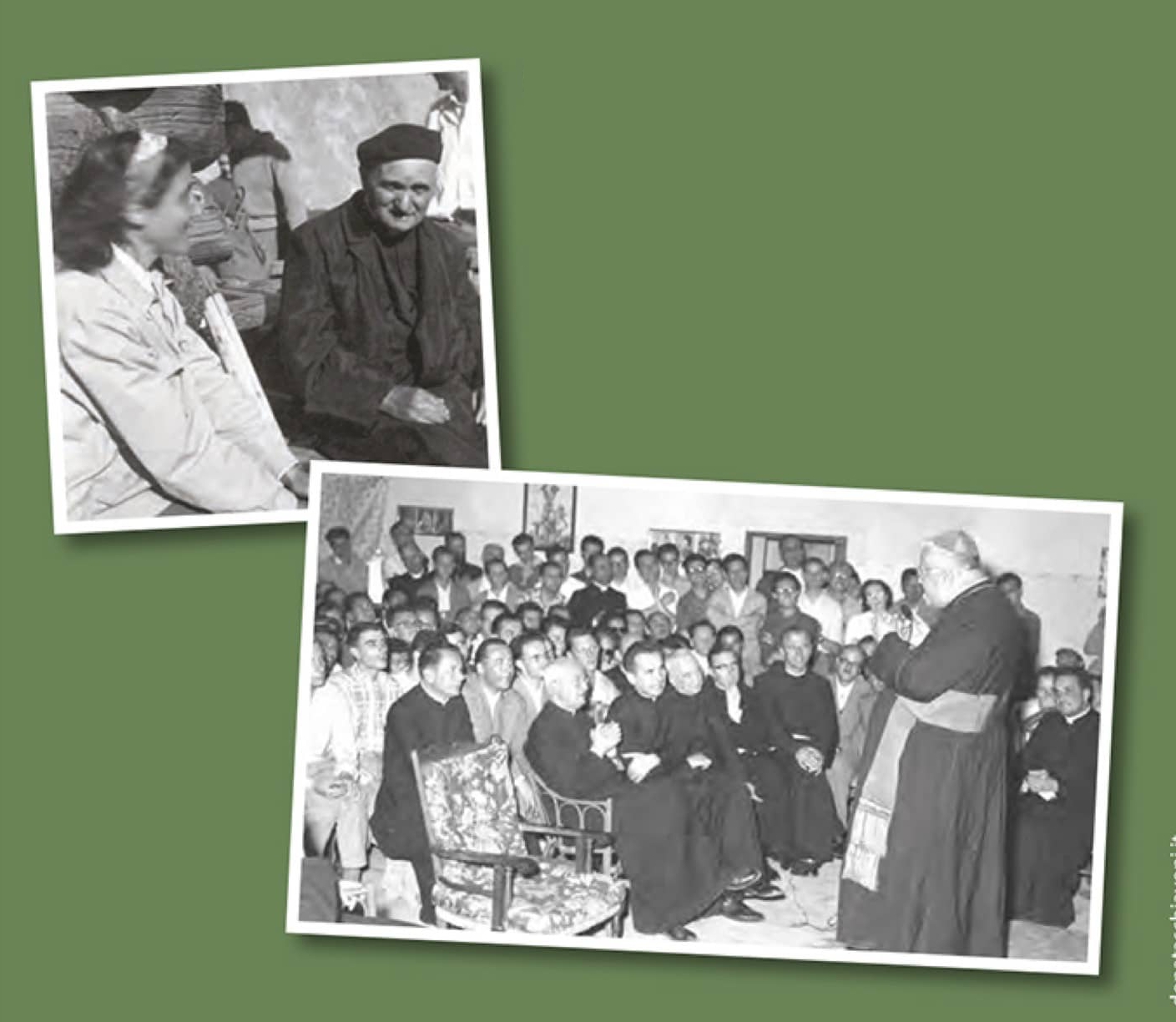 Most Reverend Highness, [1] It’s so true. The cross was heavy and still is, and in these days I understood why Jesus “fell” under the weight of the cross. But, Your Highness, I’m happy, truly happy. I’ve obtained the grace from Jesus to be ready for every decision made by the Church. Not only that, but to leave “my own” (I can still call them that for a while longer), fifty men and women focolarini in such perfect unity that they will be able to pursue their path without anyone even noticing that anything has changed. I’m happy, Highness, to be able to give God all that He has done through me in the supernatural field. I assure You that no matter what happens You can always be assured of my faithfulness to my Jesus forsaken and obedience to the Church. I’ve come this far precisely because I’ve never wanted, on my part, to break unity with the Church, or better, with whoever represented it. If I hadn’t done as I did, perhaps the Movement wouldn’t exist. But the Lord God gave me resistance even against the unimaginable. Now the Movement exists and it will never die. That it is the work of God will be shown perhaps by the fact that I will have to distance myself from it. If I must testify to Him by becoming nothing, after having borne witness to Him through Unity, I’m happy. The culmination of of the life of Jesus was spent in loving was death: and no one has greater love than to give their life for their friends. You, Father, were truly a Father to me, and you showed me (what I believed only through faith) that the Church is a Mother. I will always keep You as Father whatever the Will of God will be for me. No one can forbid me from obeying You, which means obeying the Church. What matters in becoming holy is to obey: to be one. Little does it matter whether they command us to act or not act in one way or another. Isn’t that true, Father? Father Tomasi is a holy man. He’s suffering very much at the moment and is not eating. He is suffering for me… I would never have thought that he could have such feelings.But don’t worry, Your Highness, because we are supporting him and in his presence I also feel lighthearted. In conclusion, I can only tell you one thing: I’m very happy, immensely happy. And I can assure You that Jesus Forsaken will carry me through. Besides: ‘Blessed are you when they separate you and ‘lying, say all manner of evil against you. Rejoice and be glad because your reward in Heaven is great.’ Bless me now and forever, your daughter, Chiara.” Da “Qui c’è il dito di Dio”, (Rome: Ed. Città Nuova, 2017) [1] In those years, the archbishop of Trent was addressed as “Your Highness”.
Most Reverend Highness, [1] It’s so true. The cross was heavy and still is, and in these days I understood why Jesus “fell” under the weight of the cross. But, Your Highness, I’m happy, truly happy. I’ve obtained the grace from Jesus to be ready for every decision made by the Church. Not only that, but to leave “my own” (I can still call them that for a while longer), fifty men and women focolarini in such perfect unity that they will be able to pursue their path without anyone even noticing that anything has changed. I’m happy, Highness, to be able to give God all that He has done through me in the supernatural field. I assure You that no matter what happens You can always be assured of my faithfulness to my Jesus forsaken and obedience to the Church. I’ve come this far precisely because I’ve never wanted, on my part, to break unity with the Church, or better, with whoever represented it. If I hadn’t done as I did, perhaps the Movement wouldn’t exist. But the Lord God gave me resistance even against the unimaginable. Now the Movement exists and it will never die. That it is the work of God will be shown perhaps by the fact that I will have to distance myself from it. If I must testify to Him by becoming nothing, after having borne witness to Him through Unity, I’m happy. The culmination of of the life of Jesus was spent in loving was death: and no one has greater love than to give their life for their friends. You, Father, were truly a Father to me, and you showed me (what I believed only through faith) that the Church is a Mother. I will always keep You as Father whatever the Will of God will be for me. No one can forbid me from obeying You, which means obeying the Church. What matters in becoming holy is to obey: to be one. Little does it matter whether they command us to act or not act in one way or another. Isn’t that true, Father? Father Tomasi is a holy man. He’s suffering very much at the moment and is not eating. He is suffering for me… I would never have thought that he could have such feelings.But don’t worry, Your Highness, because we are supporting him and in his presence I also feel lighthearted. In conclusion, I can only tell you one thing: I’m very happy, immensely happy. And I can assure You that Jesus Forsaken will carry me through. Besides: ‘Blessed are you when they separate you and ‘lying, say all manner of evil against you. Rejoice and be glad because your reward in Heaven is great.’ Bless me now and forever, your daughter, Chiara.” Da “Qui c’è il dito di Dio”, (Rome: Ed. Città Nuova, 2017) [1] In those years, the archbishop of Trent was addressed as “Your Highness”.
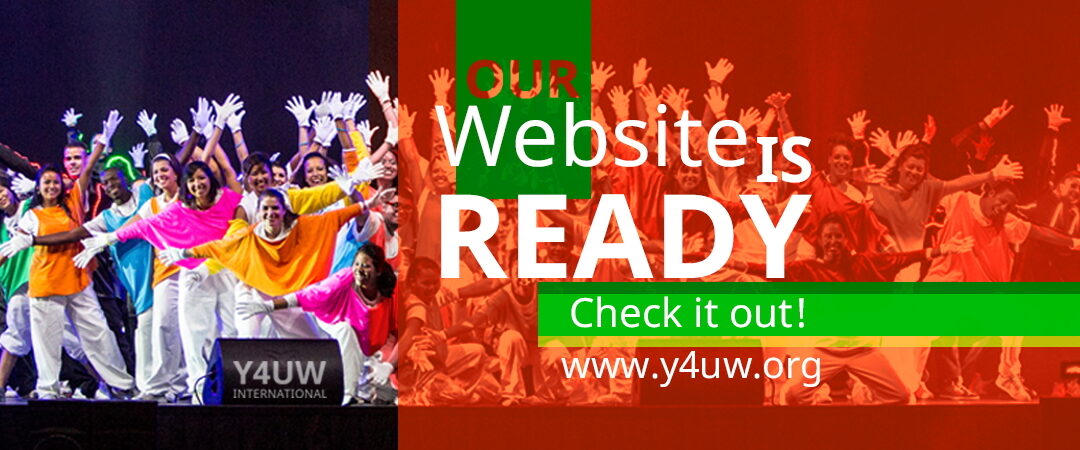
Jun 9, 2017 | Non categorizzato
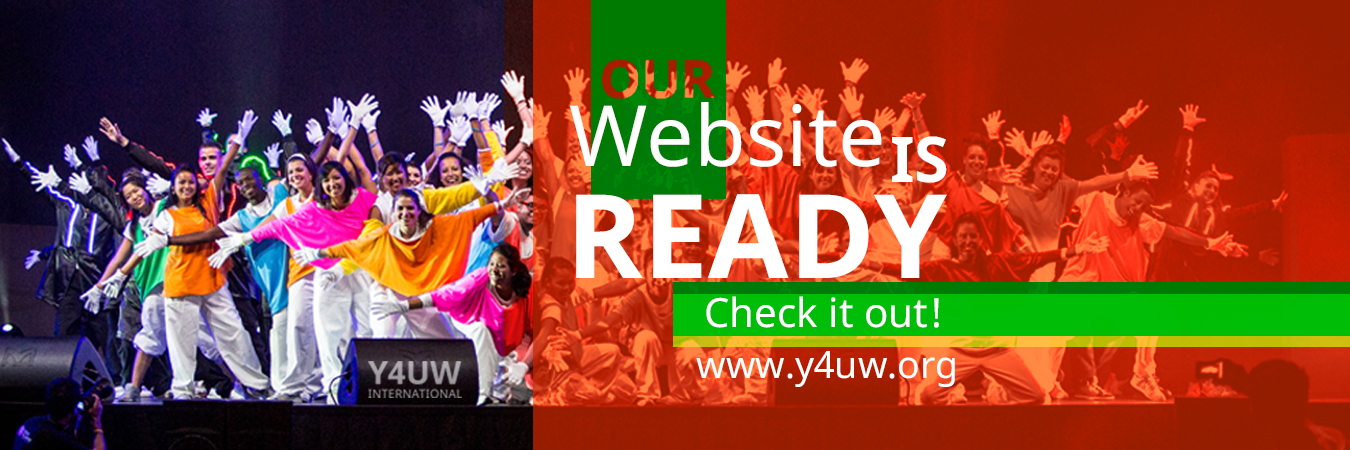 Youth for a United World is an international movement which gathers young people of different races, cultures, religions from 180 countries and across 5 continents. They strive to live for a more united world by putting into practice the Golden Rule: “Do to others what you want them to do unto you; don’t do unto others what you don’t want them to do unto you”. In order to be better connected with young people throughout the world, Youth for a United World have created new communication channels, one of which is the newly launched website yfuw.org which includes content about the movement’s history, news items as well as past and forthcoming events. Genfest 2018: the worldwide event which will take place next year (6-7 July) in Manila, Philippines. More interaction: y4uw.org gives the possible to connect up with young people around the globe.It’s possible to post comments, suggestions, feedback regarding website content but also to convey news about local youth activities. New design: the revamped website makes it easier to view current projects and to contact the protagonists. It’s possible to contact Youth for a United World through the social media: Instagram & Twitter: Y4UW.official Facebook: Y4UW.international
Youth for a United World is an international movement which gathers young people of different races, cultures, religions from 180 countries and across 5 continents. They strive to live for a more united world by putting into practice the Golden Rule: “Do to others what you want them to do unto you; don’t do unto others what you don’t want them to do unto you”. In order to be better connected with young people throughout the world, Youth for a United World have created new communication channels, one of which is the newly launched website yfuw.org which includes content about the movement’s history, news items as well as past and forthcoming events. Genfest 2018: the worldwide event which will take place next year (6-7 July) in Manila, Philippines. More interaction: y4uw.org gives the possible to connect up with young people around the globe.It’s possible to post comments, suggestions, feedback regarding website content but also to convey news about local youth activities. New design: the revamped website makes it easier to view current projects and to contact the protagonists. It’s possible to contact Youth for a United World through the social media: Instagram & Twitter: Y4UW.official Facebook: Y4UW.international
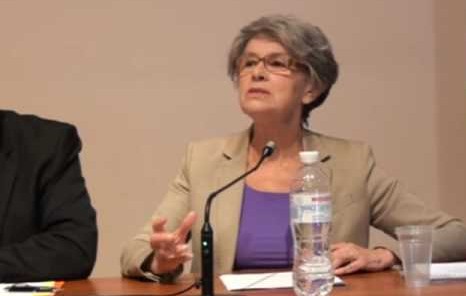
Jun 8, 2017 | Non categorizzato

Anne-Marie Pelletier
Maria Rita Cerimele
Source: Città Nuova
Jun 7, 2017 | Non categorizzato
“The role of women in the education towards universal brotherhood,” is the theme of the plenary session of the Pontifical Council for interreligious Dialogue, programmed for 7-9 June, in Rome. The event will highlight four Conferences: Sr. Nuria Calduch-Benages, Spanish biblist will speak about “Women educators in universal brotherhood,” Sr. Raffaella Petrini, professor in the Social Doctrine of the Church, will focus on “Women’s qualities against the technocratic paradigm: a Catholic and social perspective on the contribution of women to fraternity;” Marie Derain, French lawyer and infancy civil defence attorney will discuss the theme “Building peace: the role of women ;” and then Clare Amos, of the Ecumenical Council of Churches will expound on “the role of women in education in universal brotherhood.” The participants will be received by the Pope.


 “About a year ago,” Natalija continues, “we were put to the test. In summer, the smallest of our children underwent some counselling, which is done routinely when infants reach the age of three. The psychologist’s diagnosis really surprised us: Attention Deficit Disorder. As an ex-teacher and pedagogue expert, I saw before my eyes all those children who had this type of problem and the difficulties parents had to face in dealing with it. Shocked and dazed, I went back to Ray of Sunshine kindergarten, where Damijan and I both worked. We talked things over for a long time and we realized that for our son to have the best care, one of us had to give up their job.” “We knew we had to devote all our time and energy,” says Damijan. “We were conscious of the fact that we still had a mortgage, that we were six in the family and that we were low-income earners. We explored all the financial possibilities and, despite the uncertainty, I left my job believing that God would not abandon us. We shared our situation, and consequent decision, with our work colleagues. We were grateful to each one for their understanding and support. In the following week, our choice proved to be the right one. On night, my mother, who lived with us, had a stroke and remained paralyzed. It was a shock for us all. For the first two months she was able to feed herself, but there was a subsequent stroke that led to blindness and then dementia. She therefore needed more and more care. Although challenging, we respected her desire to remain at home. In the meantime, our son’s condition improved considerably. In fact things were much calmer all round. When the children arrived home from school, there was always someone waiting for them with a meal on the table. And when Natalija arrived home from work, she was able to devote herself totally to the family. Throughout this time, though living on only one salary, we can say that we lack nothing. And even if we have to give up something, it’s not a deprivation. We are grateful to God for having supported us and for having taught us to live the art of loving, and also to reap the fruits which have won us over completely.”
“About a year ago,” Natalija continues, “we were put to the test. In summer, the smallest of our children underwent some counselling, which is done routinely when infants reach the age of three. The psychologist’s diagnosis really surprised us: Attention Deficit Disorder. As an ex-teacher and pedagogue expert, I saw before my eyes all those children who had this type of problem and the difficulties parents had to face in dealing with it. Shocked and dazed, I went back to Ray of Sunshine kindergarten, where Damijan and I both worked. We talked things over for a long time and we realized that for our son to have the best care, one of us had to give up their job.” “We knew we had to devote all our time and energy,” says Damijan. “We were conscious of the fact that we still had a mortgage, that we were six in the family and that we were low-income earners. We explored all the financial possibilities and, despite the uncertainty, I left my job believing that God would not abandon us. We shared our situation, and consequent decision, with our work colleagues. We were grateful to each one for their understanding and support. In the following week, our choice proved to be the right one. On night, my mother, who lived with us, had a stroke and remained paralyzed. It was a shock for us all. For the first two months she was able to feed herself, but there was a subsequent stroke that led to blindness and then dementia. She therefore needed more and more care. Although challenging, we respected her desire to remain at home. In the meantime, our son’s condition improved considerably. In fact things were much calmer all round. When the children arrived home from school, there was always someone waiting for them with a meal on the table. And when Natalija arrived home from work, she was able to devote herself totally to the family. Throughout this time, though living on only one salary, we can say that we lack nothing. And even if we have to give up something, it’s not a deprivation. We are grateful to God for having supported us and for having taught us to live the art of loving, and also to reap the fruits which have won us over completely.”




 Belgrade (“the white city”) in Central Serbia, one of Europe’s oldest cities,lies at the confluence of the Sava and Danube Rivers. “Gateway to the Balkans” or “Gateway to Europe,” reborn after a recent past of wars, it is today an avant-garde capital, where new ideas, novelties and vitality brew in the fields of art, economy, architecture. and also sports. Last 12-13 May, on the occasion of the 20th anniversary of its foundation, the College of Sports and Health, a certified institution with 600 students, organised an international conference entitled “Sports, recreation, health.”
Belgrade (“the white city”) in Central Serbia, one of Europe’s oldest cities,lies at the confluence of the Sava and Danube Rivers. “Gateway to the Balkans” or “Gateway to Europe,” reborn after a recent past of wars, it is today an avant-garde capital, where new ideas, novelties and vitality brew in the fields of art, economy, architecture. and also sports. Last 12-13 May, on the occasion of the 20th anniversary of its foundation, the College of Sports and Health, a certified institution with 600 students, organised an international conference entitled “Sports, recreation, health.” 
 The then Archbishop of Trento, Msgr. Carlo de Ferrari, had the task of first assessing and approving the Focolare Movement at the diocesan level. The title of the recent book published by Città Nuova Publishing House “Qui c’è il dito di Dio” (Here Is the Hand of God), recalls the expression he used in reference to the evangelical experience that Chiara Lubich and her first companions were living. The context is 1951, a period when not everyone in the Church thought the same as the archbishop of Trent. Indeed, there were many ecclesiastical perplexities and suspicions, in pre-Vatican Council times, with regards to this young lay woman, who had as her followers priests, men and women religious, lay men and women, young people and not so young. Prudence suggested distancing her and perhaps replacing her with a priest. It was through these circumstances that Chiara’s decisive relationship with her bishop began. The book opens with a letter from Chiara Lubich, written from Rome, to Archbishop Carlo de Ferrari. The letter is dated January 5, 1951 and the period of trial that the nascent Movement and Chiara herself were experiencing shines through every line of the text.
The then Archbishop of Trento, Msgr. Carlo de Ferrari, had the task of first assessing and approving the Focolare Movement at the diocesan level. The title of the recent book published by Città Nuova Publishing House “Qui c’è il dito di Dio” (Here Is the Hand of God), recalls the expression he used in reference to the evangelical experience that Chiara Lubich and her first companions were living. The context is 1951, a period when not everyone in the Church thought the same as the archbishop of Trent. Indeed, there were many ecclesiastical perplexities and suspicions, in pre-Vatican Council times, with regards to this young lay woman, who had as her followers priests, men and women religious, lay men and women, young people and not so young. Prudence suggested distancing her and perhaps replacing her with a priest. It was through these circumstances that Chiara’s decisive relationship with her bishop began. The book opens with a letter from Chiara Lubich, written from Rome, to Archbishop Carlo de Ferrari. The letter is dated January 5, 1951 and the period of trial that the nascent Movement and Chiara herself were experiencing shines through every line of the text. 


